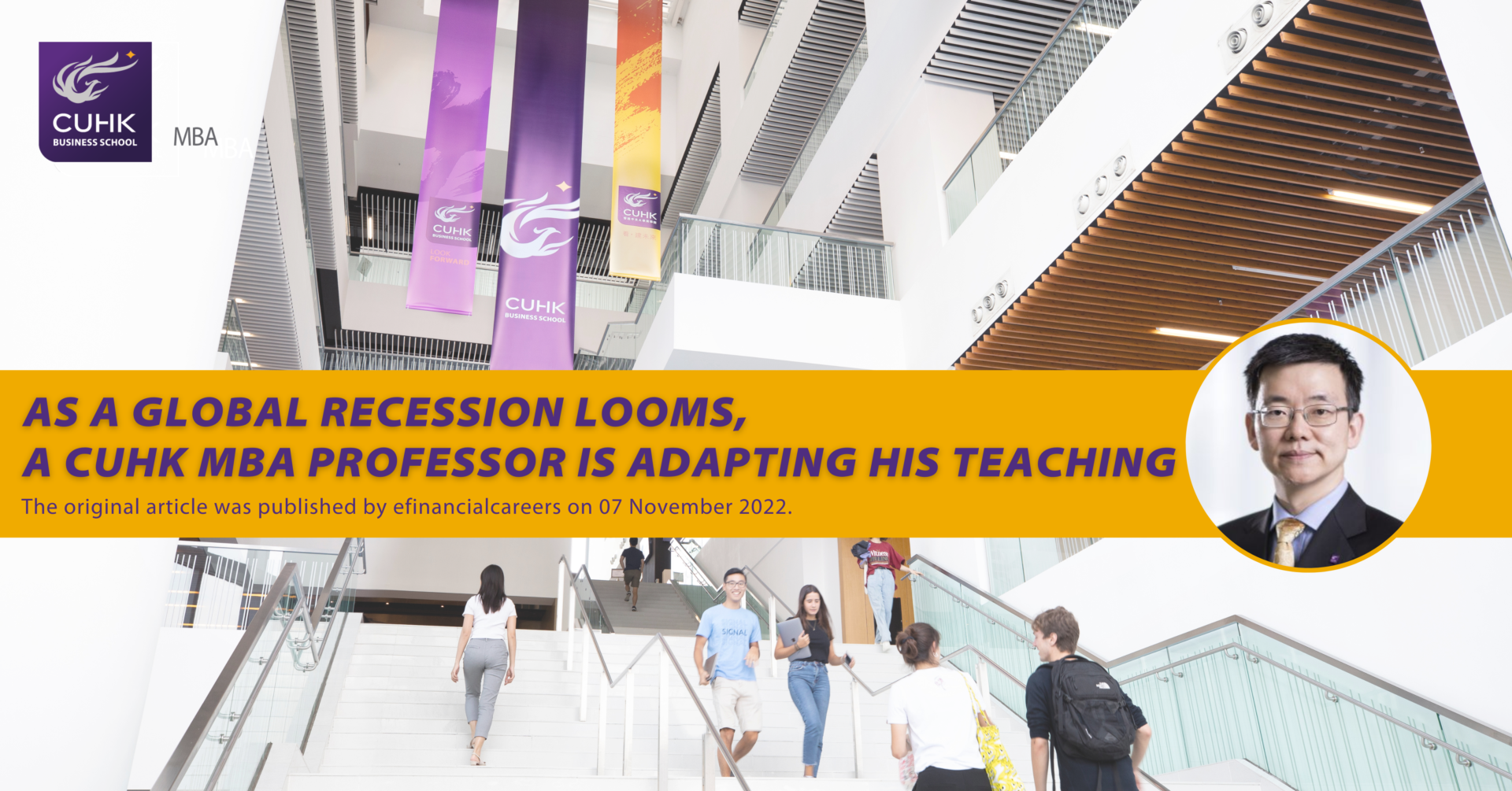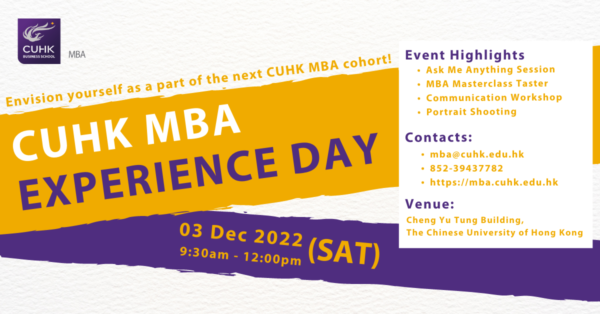As a global recession looms, a CUHK MBA professor is adapting his teaching

The world is facing a perfect storm of stagflation, geopolitical conflict, and climate risk which is set to trigger a global recession.
Professor Ling Cen, Associate Professor of Finance at The Chinese University of Hong Kong (CUHK), warns that these factors look set to lead to a recession that will last between 12 and 18 months. “We are heading for a global crisis. It is going to be very painful,” he says.
Prof Cen, who teaches on CUHK’s MBA programme, which is ranked in the top 50 in the Financial Times Global MBA Ranking 2022, points out that high inflation is not normally associated with a recession.
He attributes the current situation to the US Federal Reserve’s quantitative easing measures, first in response to the global financial crisis, and later the Covid-19 pandemic, which has seen it pump more than US$4 trillion into the economy since 2019. “This massive increase in the money supply under a low interest rate environment has triggered high inflation at a time when economic activity is not growing much,” he explains.
Meanwhile, economic activity has been hit by a combination of Covid-19 and geopolitical conflicts, including the US-China trade tensions and the war in Ukraine, which has led to sanctions on Russia by NATO countries. “No-one is the winner when COVID-19 and geopolitical conflicts reduce international trade and other economic interactions,” Prof Cen says.
At the same time, Prof Cen predicts the recent acceleration in climate change could lead to extreme winter temperatures. Although this factor is not correlated to the economic situation, he warns that the shortage of energy and food, as an outcome of the ongoing Russo-Ukrainian War, will make it worse. “By this winter, the economic recession will be fully developed, a lot of people will lose their jobs, and inflation will still be rising. Since the Russo-Ukrainian War will trigger a rising energy and wheat price, I see a very bad winter ahead of us, and a recession that will probably last 12 to 18 months, until the inflation is fully ‘corrected” by the recession.”
But despite the bleak outlook, Prof Cen thinks there are still opportunities for businesses in the year ahead. He explains: “With the current high level of risk, asset prices are low because the perceived risk premium is very high; the asset prices are likely to fall further when all risks gradually expose themselves” As a result, he says firms with good liquidity and high cash reserves, will have a prime opportunity to buy both financial and real assets at a discounted price, enabling them to make higher returns over the long term.
Adapting his teaching
Prof Cen is constantly adapting his teaching material to reflect the changing global economic situation. “Every instructor of MBA classes needs to incorporate the current hot topics into their lecture notes,” he says.
For example, he has made changes to the mergers and acquisitions (M&A) course he teaches for CUHK’s MBA programme to reflect recent moves by the US government to prevent Mainland China firms buying semi-conductor products from the US. “I would expect Chinese companies to restructure their global supply chains, in order to circumvent the US sanctions. For example, Chinese firms might be interested in buying Canadian or Mexican firms because the North American Free Trade Agreement allows Canadian or Mexican firms to buy anything from the US; alternatively, they can move their plants to Vietnam and pretend to be Vietnamese firms,” he explains.
Meanwhile in his M&A and Behavioural Finance classes, he is putting an increased focus on environment, social and governance (ESG) considerations. “ESG considerations are becoming increasingly important. It can affect asset pricing and definitely impacts almost all aspects of M&As,” he says.
Prof Cen explains that companies are paying increased attention to climate risk when doing deals, looking at whether potential targets are in an environment that is vulnerable to climate change, or whether they create significant pollution that triggers regulatory risks. Social factors are also an important consideration, particularly as M&As tend to lead to workers being laid off as the acquirer looks to benefit from labour cost reduction as a main source of operating synergies. “If an acquirer would like to lay off workers in an area that is mainly populated by ethnic minority workers, the acquiring firm has to be really careful about social issues triggered by this decision,” he says.
His own research also informs his behavioural finance teaching. Using big data analysis, he has found that the Black Lives Matter (BLM) and #MeToo movements have driven an increase in consumers’ preference for products produced by firms that hold a higher standard in workplace diversity and equality.
A focus on finance
Students studying CUHK’s MBA programme have the opportunity to focus on one of six key areas, including finance. Those who opt for the finance concentration can take courses covering areas ranging from current fintech trends, to investment analysis and portfolio management, to corporate fundraising in Chinese equity markets.
Prof Cen thinks students studying the finance concentration at CUHK have a strategic advantage as the university is located almost exactly halfway between the Hong Kong Stock Exchange and the Shenzhen Stock Exchange, offering students exposure to both markets. CUHK’s MBA programme has a strong focus on Asia, and particularly the Greater Bay Area (GBA), which Prof Cen believes is set to become increasingly influential across Asia.
Another advantage CUHK offers is that it was the first Asian business school to offer an MBA. “We have the largest alumni network. I often joke that I can go into any financial institution in Hong Kong and Shenzhen, however big or small, and find a CUHK alumni there. It gives new students and existing alumni a tremendous advantage.”
For anyone considering studying CUHK’s MBA, Prof Cen says: “Just apply! It’s going to be a very valuable experience. In the current environment, an MBA is one of the best human capital investments business people can make.”
Ready to take the first step toward a life-changing experience and accelerate your career? Join the CUHK MBA Experience Day on 3 December 2022. During the event, CUHK welcomes aspiring working professionals, faculty members, alumni, and current students to join a variety of activities! These include mingling session and communication workshop. Be sure to take a masterclass taster with Prof Cen to have a taste of being an MBA student. Grab the chance to network and discover if this could be the right fit for you. Click here to register.

The original article was published by efinancialcareers on 7 November 2022.

